Photos by Jono White
404 is the error message that appears when you go to a web address that doesn’t exist; ‘404 not found’, or something to that effect. Yet hip hop four-piece 404 Guild are the kind of artist you can only find if you go on a quest. When they first started performing and recording, they quickly earned a reputation for abrasive, punkish shows that conjured mosh pits lasting the whole set. But between those early shows and the release of their debut album, False Dawn, on 9 December, they have been learning to make more noise by being quieter.
Terms like ‘group’ and ‘band’ are increasingly being replaced by terms like ‘collective’. When I ask about the choice of ‘guild’, however, I’m pleasantly surprised to find a common point of interest. “Aesthetically, we had a shared vision of fantasy fiction, video games and movies,” vocalist and guitarist, Charlie Okmore says, “so this thing is an adventure.” It brushes the dust off memories of playing RPGs like Final Fantasy and Tales Of The World, in which guilds are where you go to pick up a new quest or switch between jobs – mage, knight, thief, etcetera. It holds additional significance too, says vocalist Tay Devenny. “A guild is different people with different skill sets coming together that share a common cause: expressing ourselves in the purest way that we can.”
Individually and collectively, their quest has been one of epic proportions. Like many RPGs, it begins with disparate individuals in a small town, which in this case is Eastbourne, West Sussex. Devenny and producer, Brendan Murphy were making music together; Okmore and Hunter Jenkins were in a ‘funky indie rock band’ (in Charlie’s words). Devenny started hanging out at the shed where the rock band rehearsed, but by this point the heated rivalry between the two groups had boiled over into bad blood between some of their inimical members.
It might seem strange that artists who not only competed but disliked each other eventually joined forces. To many though, the enemy to ally transition will feel all too familiar. “Because we were in a small town, we didn’t know many people doing the same sort of thing,” Devenny says. “It developed into respecting each other’s crafts, and instead of doing it separately, just saying, ‘Why don’t we all just come together?’” The moment at which they joined forces and essentially became a guild is clearly significant to them all. As soon as Devenny mentions it, Murphy and Okmore both start reminiscing about “that meeting around Charlie’s parents’ kitchen table”.
That was almost a decade ago now, a long time to wait for their debut album. In the meantime, they’ve released plenty of singles and EPs both as a group, as well as in splinter or solo projects. But having bided their time they know they’re ready to make their first grand statement; in their minds, they needed to release an album now. “We did all the side quests to ‘level up’ and farm EXP,” Jenkins says, continuing with the RPG metaphor, “and when we came back, we’d gathered the skills to make the album as good as it should be.”

There are more serious reasons behind the long wait for the group’s first album. There was, of course, the pandemic, and before that tragedy struck when founding member and lead singer Mina Topley-Bird took her own life. Her voice plays an integral role on their first two EPs, 2019’s Guild One and Guild Two: Forever. The death of such a close friend was – and still is – devastating. “We all still grieve,” Devenny says. “Part of why we keep going is to keep her name, her life and her essence around. We’re very proud to have known Mina and to still know her. We wouldn’t be, y’know, this if it wasn’t for her. It was never on the cards to quit.”
Although some artists find therapeutic value in using creative outlets in times of grief, 404 required time away from making music. Murphy says, “In the period after Mina died, I wasn’t really able to make music. I need to be in a good place already to be making stuff that I’m happy with. It was maybe eight months to a year after that I knew I could start making music with these boys again. And that felt really good because I realised I’d got to a certain point in the grieving process, but it wasn’t like I was using it to work.” That was around the same time I saw them live for the first time without Topley-Bird, in Bristol for Independent Venue Week. It was the punkiest I have ever seen them play. The three times since then – for their comeback from the pandemic in October 2021, their Windmill residency this August, and last week for their album release – the mosh pits have grown fewer and fewer.
False Dawn is not only the group’s long-awaited debut album then, but also a big part of their individual and collective grieving process. Therefore, it was crucial to get it just right. They spent months working on new tracks, but ended up scrapping the whole lot. None of the songs represented all of them. “We operate according to feeling and not according to necessity,” Devenny says. “We want to produce a good representation of an idea that we have together. I think we all needed to get to that place and that took a while. Some people might have been there before others – and that’s okay.”
Even though they had amassed a lot of material in their years working on side quests, the main storyline eventually took them back to their home county of West Sussex. Instead of going to a recording studio, they booked an outhouse in a country estate on Airbnb, and brought all of their own equipment. They completely designed, wrote and recorded the album in two weeks. “You’d walk in and there was a big oak table where we put all our kit,” Devenny says. “There was one bedroom on either side, so we’d wake up in the morning and there was this one room to make music. That’s all we had. Just us and the chickens.”

The extra pressure of the West Sussex outhouse was exactly what 404 Guild needed to make the album they knew they wanted. They had all moved to London to become immersed in music and practice as much as possible, but it was necessary to remove themselves from the distractions of the city to focus on False Dawn. It can be hard to get clarity on what you’re doing in the eye of the tornado – it requires stepping back to refocus and gain back perspective on what you’re trying to do. “We weren’t trying to speed run the album in an hour,” Devenny says. “There’s a reason we were able to go away and make an album in such a short space of time: we’re very close. It took us years to get to that point.” Every day, they would wake up, take a walk through the countryside for an hour or two, and record a couple of false starts before settling on a building block for the day’s track.
Learning to quieten down has been a learning process for the guild. Playing loud, raucous shows guaranteed a good vibe, but after doing it for years, they wanted to make music that causes people to react in a more introspective way. Mixing live guitars and drum samples with 808s and synthetic sounds, its biggest textural comparison is J Hus’s Big Conspiracy. They also sampled AI generated music, took visual inspiration from AI generated art, and borrowed unintuitive lyrics from AI generated words. The only song that really sounds like the old, enraged 404 is ‘Contact’. Instead, the group punctuate the album with momentary lapses of fervour throughout. On ‘New Health’, one of False Dawn’s best tracks, the group fully embrace spoken word, which they back with a euphoric lofi house beat.
False Dawn is a fitting title for an album that symbolises anything but the beginning of 404’s quest; although Topley-Bird’s presence is everywhere felt on it, this is not a memorial or a retrospective. Many artists make a point of addressing the stigma of mental illness directly in their music, but for 404, the connection is more oblique. “If someone needs to hear something that literal, then I understand that,” Devenny says, “and we can all be depressed, but we’d rather have a real conversation: something tangible. We want that feeling, rather than the statement, to come through the music.”



